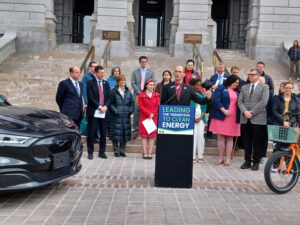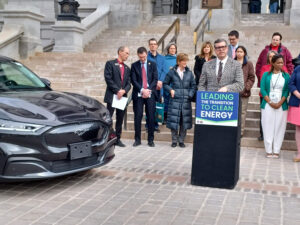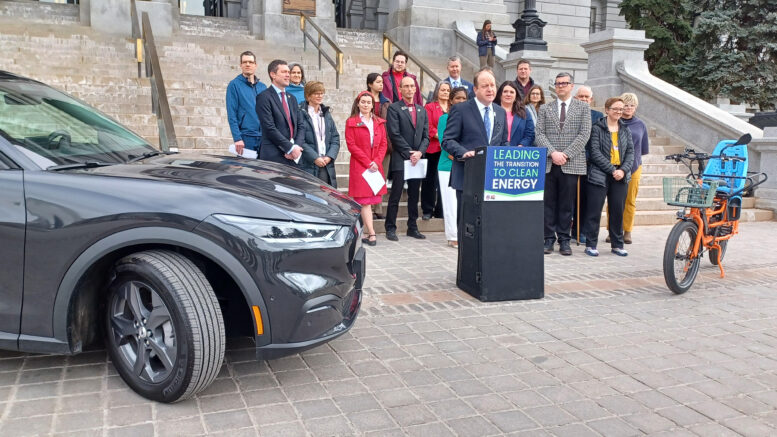During a legislative session in which energy and environmental legislation is expected to come in the form of both carrots and sticks, Gov. Jared Polis and Democratic legislators rolled out a big package of carrots on Wednesday to incentivize residents and businesses to go green.
The package, unveiled in a news conference on the Capitol steps, included yet-to-be-introduced bills to push utilities to invest in geothermal energy, provide grants for local governments to streamline solar inspections and offer incentives for green-hydrogen production. It also includes a coming bill that Polis previewed in his supplemental budget package in January to offer $120 million in annual tax breaks for decarbonization tools ranging from electric vehicles to high-efficiency heat pumps to pollution-reduction investments by industrial facilities.
Not mentioned at the event were an expected cadre of bills that would take a decidedly more regulatory approach to trying to reduce pollution and greenhouse-gas emissions. Those bills, including an air-quality permitting bill under discussion that oil-and-gas-industry executives fear could serve as a de facto shutdown of the industry, are in earlier stages of talks between legislators, environmental activists and industry groups.
The bills that Polis and legislators highlighted on Wednesday — while surrounded by an electric Ford Mustang and by an e-bike — are ones the Democratic governor described as creating “an exciting path forward on clean energy.” While their core purpose is to help achieve Polis’ goal of a 100% renewable-energy grid by 2040, they also can help businesses and their workers to afford electric vehicles or to innovate in areas like battery storage, he and supporters said.

Colorado state Rep. Mike Weissman offers details Wednesday of a $120 million green-energy tax-credit bill that he plans to introduce.
“All in all, we are excited today to save people money, to save businesses money, to bring new jobs to Colorado and to clean up our air,” said Rep. Mike Weissman, D-Aurora.
Bills specifics — and lack thereof
Weissman will be one of the main sponsors of the bill that will create $120 million in new clean-energy tax credits. That package will include $5,000 tax credits that Coloradans could use on electric vehicles by as soon as later this year — making the savings available long before new federal tax credits for such cars and trucks kick in, since the federal credits are contingent on electric vehicles employing fully American-made batteries that are not manufactured here yet.
The tax credits also will include $800 breaks on e-bikes, breaks between $500 and $3,000 for heat pumps and unspecified incentives for factories to use on pollution-reduction tools. Those perks are in addition to breaks proposed by Democratic Sen. Chris Hansen of Denver for purchase of electric lawn equipment in Senate Bill 16, which has passed two committees and awaits action in the Senate Appropriations Committee.
Utilities stand likely to benefit from a yet-to-be-introduced proposal in the package that will let them include thermal energy as a clean-heat resource. They also could benefit from another coming bill that is aimed at allowing them to invest in geothermal energy, hydrogen energy and long-duration battery storage in order to meet their goals of boosting renewable energy.

Colorado state Rep. Alex Valdez on Wednesday discusses a bill he plans to introduce to ensure that new multifamily construction is equipped to offer more electric-vehicle charging ports.
Some proposals lack details, including one from Rep. Alex Valdez, D-Denver, that is aimed at ensuring new multifamily construction includes pre-wiring that can allow users of certain parking spaces to put electric-vehicle charging ports in them if desired. Polis vetoed a bill last year that would have put into place very specific requirements about what must be included in such construction, but he indicated Wednesday that he will support something with fewer technical requirements this year.
It’s clear that one of Polis’ goals is to expand the universe of energy sources that Coloradans can use to move away from coal, oil and natural gas as primary fuels. A coming bill from Rep. Brianna Titone, D-Arvada, would create a regulatory framework for green hydrogen to be used in sectors from long-haul trucking to industrial processes and would create a hydrogen usage credit to encourage production of the fuel and direct it toward those areas.
Polis has said several times in speeches this year that he wants to move away from natural gas because of its pricing volatility, which led legislators to create a special committee that met for the first time Tuesday to study rising utility prices. Energy-sector leaders have pushed back, arguing that natural gas is a clean and relatively inexpensive fuel that is needed to bridge the transition from fuels like coal to the alternative fuels that Polis wants to see used but that are not as readily available today.
